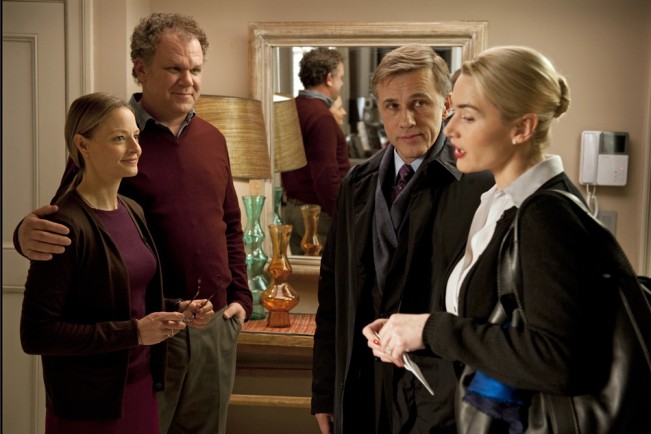By MCN Editor editor@moviecitynews.com
THE FILM SOCIETY OF LINCOLN CENTER announces the North American Premiere of Roman Polanski’s CARNAGE as Opening Night Gala selection for the 2011 NEW YORK FILM FESTIVAL
 New York, NY, July 29, 2011 — The Film Society of Lincoln Center announced today that Roman Polanski’s CARNAGE will make its North American Premiere as the Opening Night film for the upcoming 49th New York Film Festival (September 30 – October 16).
New York, NY, July 29, 2011 — The Film Society of Lincoln Center announced today that Roman Polanski’s CARNAGE will make its North American Premiere as the Opening Night film for the upcoming 49th New York Film Festival (September 30 – October 16).
“From KNIFE IN THE WATER (which screened at the first edition of NYFF in 1963) to REPULSION to THE TENANT, Roman Polanski has shown himself to be an absolute master at making the most restricted spaces come to dramatic life. In CARNAGE, aided by four remarkable performances, he has reached a new pinnacle in his already extraordinary career,” says Richard Peña, Selection Committee Chair & Program Director, The Film Society of Lincoln Center.
Based on Yasmina Reza’s “God of Carnage”, the 2009 Tony Award-winner for Best Play, CARNAGE follows the events of an evening when two Brooklyn couples are brought together after their children are involved in a playground fight. Produced by Said Ben Said, the Sony Pictures Classics release stars Academy Award winners Jodie Foster, Kate Winslet and Christoph Waltz and Academy Award nominee John C. Reilly.
Commenting on the Opening Night Selection, Rose Kuo, Executive Director, The Film Society of Lincoln Center, said, “We are delighted to kick off the festival with a quintessential New York story featuring superb performances from a quartet of the finest actors working today. The film will certainly provoke the kind of discussions about contemporary issues that guarantee a memorable night.”
The 17-day New York Film Festival highlights the best in world cinema, featuring top films from celebrated filmmakers as well as fresh new talent. The selection committee, chaired by Peña also includes: Melissa Anderson, Freelance Critic; Scott Foundas, Associate Program Director, The Film Society of Lincoln Center; Dennis Lim, Editor, Moving Image Source & Freelance Critic; and Todd McCarthy, Chief Film Critic, The Hollywood Reporter.
General Public tickets will be available September 12th. There will be an advance ticketing opportunity for Film Society of Lincoln Center Patrons and Members prior to that date. For more information visit www.Filmlinc.com/NYFF or call 212 875 5601.
Film Society of Lincoln Center
Under the leadership of Rose Kuo, Executive Director, and Richard Peña, Program Director, the Film Society of Lincoln Center offers the best in international, classic and cutting-edge independent cinema. The Film Society presents two film festivals that attract global attention: the New York Film Festival, currently planning its 49th edition, and New Directors/New Films which, since its founding in 1972, has been produced in collaboration with MoMA. The Film Society also publishes the award-winning Film Comment Magazine, and for over three decades has given an annual award—now named “The Chaplin Award”—to a major figure in world cinema. Past recipients of this award include Charlie Chaplin, Alfred Hitchcock, Martin Scorsese, Meryl Streep, and Tom Hanks. The Film Society presents a year-round calendar of programming, panels, lectures, educational programs and specialty film releases at its Walter Reade Theater and the new state-of-the-art Elinor Bunin Munroe Film Center.
The 49thAnnual New York Film Festival is made possible by the generous support of Royal Bank of Canada, 42BELOW, American Airlines, the New York Times, Stella Artois, Lilly, HBO FILMS, WABC-7, Dolby, Kodak, WNET New York Public Media, the National Endowment for the Arts, and the New York State Council on the Arts. For more information, visit www.filmlinc.com
# # #













